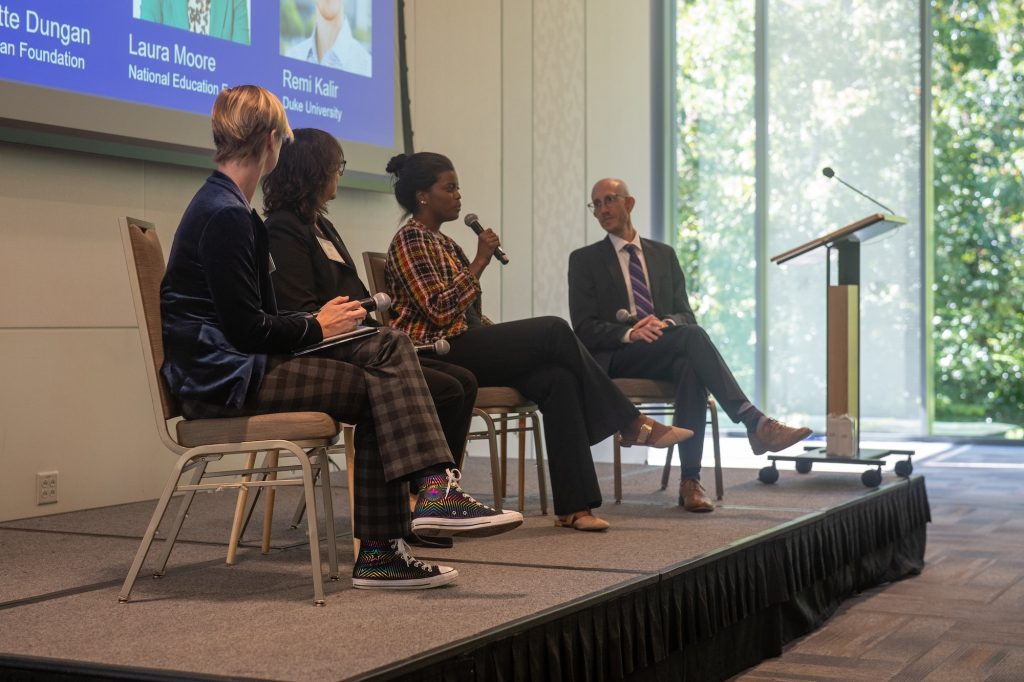Over 300 attendees joined us for three days of inspiring presentations and engaging discussions at the 2024 Emerging Pedagogies Summit, which explored the theme of Designing and Scaling Transformative Learning For All. Through their work with lifelong learners, LILE staff regularly engage with both the challenges and opportunities these emerging pedagogies present. In this series of Summit reflections, they share with you their major takeaways from each session.
In a thought-provoking session titled “Scaling College Pathways for Underrepresented Students,” panelists Charlotte Dungan, Chief Learning Officer for the Mark Cuban Foundation, Laura Moore, Chief Higher Education Officer for the National Education Equity Lab, and Leah Bug, Director of The Engineering Place at North Carolina State University, discussed the multifaceted approaches needed to support historically marginalized learners. Moderated by Remi Kalir, the conversation delved into the importance of creating welcoming educational environments, emphasizing that true success involves fostering both academic and personal growth in students. Dungan highlighted the necessity of self-determination theory, suggesting that students must see themselves reflected in their programs, while Moore emphasized the foundational role of relationship-building from initial contact, such as the welcoming tone of an email. Bug shared insights from NC State’s Women in Engineering program, which helps female students connect with the campus culture and industry through relatable alumni social experiences. Some of these experiences included parents as well.

As the panelists tackled the challenges of scaling these initiatives, issues like translation and cultural hurdles in institutions were brought to the forefront. Dungan noted that simply translating applications is not enough; comprehensive support systems must be established. Moore addressed the complexities of introducing dual enrollment programs in four-year institutions, which often lack the infrastructure seen in community colleges. Funding and the need for more partnerships emerged as critical topics from Bug, who pointed out the additional microaggressions women face in engineering fields. Looking ahead, each panelist expressed their vision for success: from Dungan’s commitment to Universal Design for Learning (UDL) to Moore’s ambitious goal of supporting one million students in the next decade, and Bug’s desire to enhance students’ problem-solving skills through outreach. This session not only illuminated the current landscape of educational equity but also underscored the collaborative spirit required to transform it.
As a high school educator with over 15 years of experience working with marginalized learners, I truly valued the opportunity to connect with representatives from organizations that share my passion for education. At the heart of my teaching philosophy is the commitment to fostering a ‘growth mindset’ among my students. This concept, which emphasizes the belief that everyone can learn, is especially crucial for PK-20 and pre-college learners. Building a foundation of resilience and determination at this stage is vital for helping them navigate the challenges they’ll encounter in higher education.
Implementing supportive strategies, such as flexible grading systems and opportunities for remediation, empowers students to believe in their potential to improve and learn. While the panelists at the event may not have explicitly labeled their approaches as ‘growth mindset,’ their insights and actions resonated with this idea.
A standout example came from Moore, who recounted a story about a student overwhelmed by the demands of an engineering course. He felt unqualified and was ready to give up. However, with the right support, his perspective transformed. Not only did he complete the engineering course, but he also excelled, finishing first in the nation! Now a senior at SUNY Buffalo majoring in Engineering, his journey is truly inspiring.
Encouraging a growth mindset means providing learners with support that they can view as a stepping stone rather than a hindrance.

